Insiders
Maldives, A Model for Sustainable Tourism

 Maldives Promotion House – During the past years, the tourism industry of Maldives has proved to be extremely successful. The quick pace of its development has gained the country numerous awards and unmatched popularity. In fact Maldives has been used by experts in the industry as an example.
Maldives Promotion House – During the past years, the tourism industry of Maldives has proved to be extremely successful. The quick pace of its development has gained the country numerous awards and unmatched popularity. In fact Maldives has been used by experts in the industry as an example.
In an article written by a Chartered Marketer and Senior Lecturer of Open University in Sri Lanka, Nalin Abeysekera, he states that the tourism industry of Sri Lanka could benefit from the example of countries such as Maldives.
“Tourism in the Maldives is the largest industry for the country. It is always the practice of travelling for pleasure and the business of providing tours and services in Maldives. There was a nice story behind this as well. Back in the 1960s a UN report said that none of the 1,100 islands were suitable for tourism,” Nalin wrote.
He goes on to describe the superior development of Maldives despite the initial UN reports. He also explains why Maldives is considered a model for sustainable tourism.
“Today, Maldives is synonymous with terms such as luxury getaway, paradise on earth, lavish holiday, et al, and the United Nations holds the country as a ‘model for sustainable tourism’,” he wrote.
He further explains how the tourism industry in Maldives started in the 1970s with just two resorts with a capacity of about 280 beds in Kurumba Village and Bandos.
“Today, more than 500,000 tourists visit the Maldives each year. The most important factor is the way the country is targeting the tourists from the counties like China,” Nalin wrote.
Using the tourism statistics of Maldives he showed the increasing number of tourists to Maldives and how it has developed the industry.
“The Maldives received more than 65,000 Chinese tourists in the first five months of this year, a 56.7 percent increase over the same period of 2010, according to the latest figures. Numbers from the Maldivian tourism authorities illustrate that the number of Chinese tourists to the Maldives accounted for 16.6 percent of the total foreign tourists from January to May, ranking top of foreign visitors, followed by Italy with 47,900 tourists, Britain, Germany and France,” Nalin concludes.
Though Nalin has just taken Maldives as an example, he proves a very important point. Our geography, our cultural heritage, our unmatched beauty, and our unique place in nature are not the only things that make Maldives the perfect destination. Our superb hospitality and service is merely an add-on to the strategically planned idea of sharing our special country with the rest of the world.
Action
Freediving with tiger sharks: Shark Expedition Fuvahmulah collaborates with marine biologist Andriana Fragola

Shark Expedition Fuvahmulah, renowned for its world-class scuba diving encounters, has announced an exciting expansion: the chance to freedive with tiger sharks in the Maldives’ southernmost atoll.
Fuvahmulah, often hailed as the “Tiger Shark Capital of the World,” is the only place on the planet where year-round encounters with tiger sharks are virtually guaranteed. With more than 280 identified resident tiger sharks, the island has become a bucket-list destination for divers and marine enthusiasts alike.
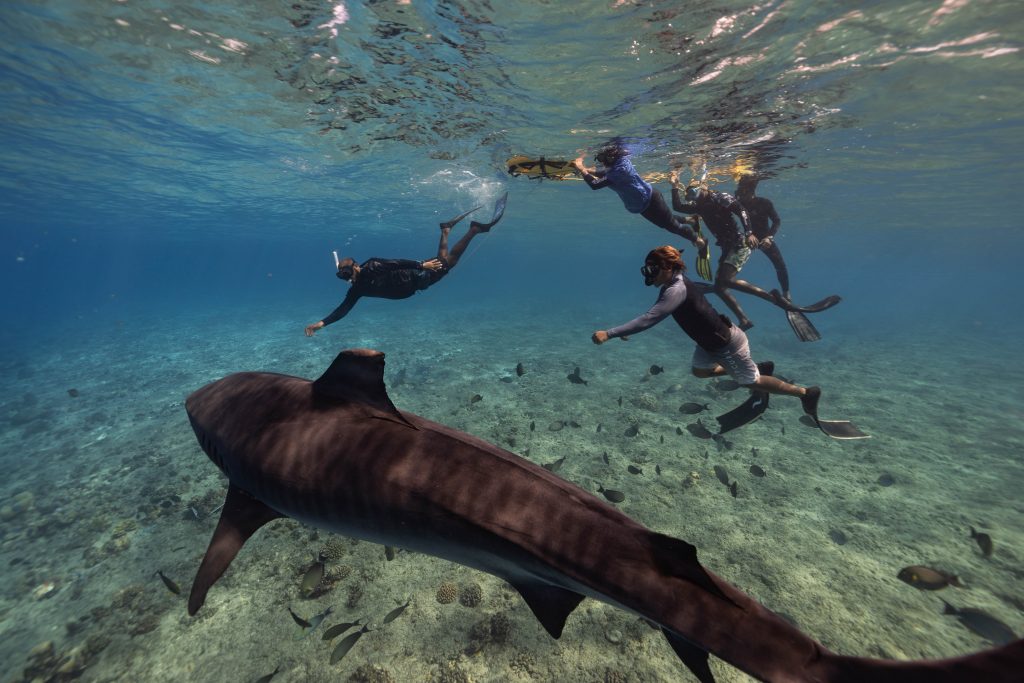
The newly introduced freediving experience offers a unique way to interact with these apex predators. Unlike scuba diving, freediving takes place without bubbles or heavy gear, allowing participants to connect with tiger sharks in a quieter, more natural way. This approach often makes the encounter more comfortable for the sharks and more intimate for the diver.
Guiding these expeditions is Andriana “Andy” Fragola, a marine biologist, shark diver, and conservationist currently based in Hawaii. Andy holds a Master’s Degree in Marine Conservation Biology with a focus on shark microbiology and has dedicated her career to shark research, conservation, and public education. Through her work in media and content creation, she strives to raise awareness about the importance of shark conservation and inspire people to take action to protect marine ecosystems.
“Freediving with tiger sharks is a raw and transformative experience,” says Andy. “Being eye-to-eye with these incredible animals without the barrier of scuba gear allows you to see them for what they truly are—powerful, intelligent, and essential to the health of our oceans.”
Shark Expedition Fuvahmulah ensures that all freediving activities are conducted under strict safety protocols. With experienced professionals like Andy leading the dives, participants can expect both an exhilarating and responsible adventure.
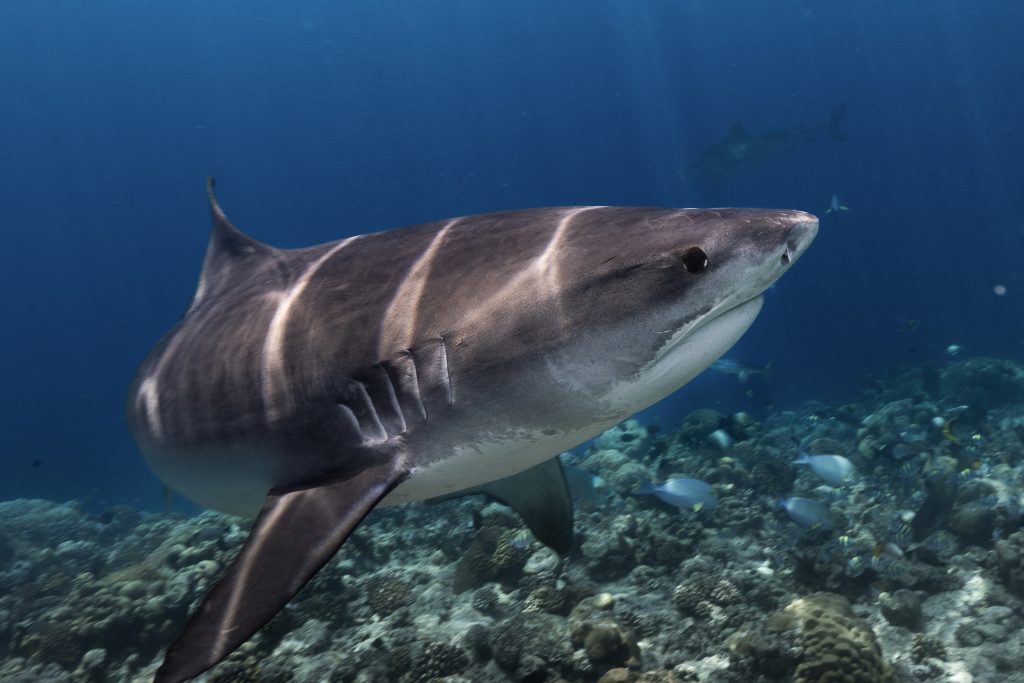
Why this experience stands out:
- Eye-to-eye encounters with tiger sharks in their natural habitat.
- A deeper, more personal connection with marine life.
- Expert-led guidance ensuring safety and conservation awareness.
In addition to freediving, Shark Expedition Fuvahmulah offers a range of packages, including accommodation options, making it easier for adventurers to fully immerse themselves in the island’s extraordinary marine environment.
For bookings and more information:
📧 Email: sales@scuba-expeditions.com
📱 WhatsApp: +960 9894653
🌐 www.scuba-expeditions.com
News
MIC appoints Ali Shakir as Group General Manager

Maldives Inflight Catering Pvt Ltd (MIC) has announced the appointment of Ali Shakir as the Group General Manager. With over 27 years of experience in the hospitality industry, Ali Shakir will now oversee operations for the Maldives Inflight Kitchen, Hulhule Island Hotel, and Madifushi Private Island Maldives.
Ali Shakir, who most recently served as General Manager at OBLU NATURE Helengeli by SENTIDO, played a pivotal role in the resort’s redevelopment and reopening. Prior to that, he joined Atmosphere Core in 2019 as Resort Manager at VARU By Atmosphere, where he was instrumental in the pre-opening of several properties, including OBLU XPERIENCE Ailafushi, OBLU SELECT Lobigili, OZEN RESERVE BOLIFUSHI, and VARU By Atmosphere. His wealth of experience also includes key positions at prestigious resorts such as Angsana Velavaru, Hulhule Island Hotel, and Paradise Island Resort and Spa.
Ali is no stranger to MIC, having spent more than 15 years at Hulhule Island Hotel, where he rose through the ranks to become Executive Assistant Manager before departing in 2019.
Commenting on his new role, Ali Shakir expressed his enthusiasm:
“I am honored to rejoin MIC and lead the operations of these iconic properties. This company has always held a special place in my career, and I am excited to work with the talented team to drive further success and innovation.”
Ibrahim Shareef Mohamed, Managing Director of MIC, welcomed Ali to the leadership team, praising his extensive experience and strategic vision:
“We are delighted to have Ali back at MIC. His proven track record in the hospitality sector, combined with his in-depth knowledge of Hulhule Island Hotel and his previous achievements, makes him the ideal leader to take us forward. I have no doubt that under his leadership, MIC will continue to set benchmarks for excellence.”
Ali Shakir holds a General Managers Program certificate from Cornell University, USA, and a General Hotel Service certification from the Institute of Hotel and Catering Service, Maldives.
MIC is a joint venture between Maldives Airports Company Limited and SATS Ltd, renowned for its inflight catering services to airlines and private jets. Beyond the Maldives Inflight Kitchen, MIC also manages Hulhule Island Hotel, the only airport hotel at Velana International Airport, and the luxurious Madifushi Private Island Maldives in Meemu Atoll.
Tips & Advice
Flying after scuba diving: Essential guidelines for safe travel

Scuba diving in the Maldives offers an unparalleled experience, with its vibrant coral reefs, diverse marine life, and crystal-clear waters. However, one crucial aspect that divers must consider is the timing of their flights after diving. Understanding the recommended waiting periods before flying is essential to ensure safety and prevent decompression sickness. Here’s what you need to know.
Understanding Decompression Sickness
Decompression sickness, also known as “the bends,” occurs when nitrogen bubbles form in the bloodstream and tissues due to rapid changes in pressure. This can happen if a diver ascends too quickly or flies too soon after diving. The reduced cabin pressure in an airplane can exacerbate the formation of these bubbles, leading to serious health risks.

Recommended Waiting Times
The waiting time before flying after scuba diving depends on the type and number of dives completed. Here are the general guidelines:
- Single Dive: If you have completed a single, no-decompression dive, it is recommended to wait at least 12 hours before flying. This allows sufficient time for the body to eliminate excess nitrogen.
- Multiple Dives or Multiple Days of Diving: For divers who have completed multiple dives or have been diving over several days, the recommended waiting period extends to 18 to 24 hours. This longer duration helps ensure that nitrogen levels in the body have decreased to safe levels.
- Dives Requiring Decompression Stops: If your dive profile included decompression stops, it is crucial to wait at least 24 to 48 hours before boarding a flight. Decompression dives involve higher nitrogen absorption, necessitating a longer off-gassing period.
Seaplane and Domestic Flights
Many tourists visiting resorts and other islands in the Maldives travel by seaplane or domestic flights. While these flights generally operate at lower altitudes compared to international flights, the same waiting time guidelines apply. The reason is that even at lower altitudes, the risk of decompression sickness remains significant due to the changes in pressure.
Practical Tips for Divers
- Plan Your Dives and Flights: When planning your diving trip, consider your flight schedule. Ensure that you have ample time between your last dive and your flight to adhere to the recommended waiting periods.
- Stay Hydrated: Proper hydration can aid in the elimination of nitrogen from the body. Drink plenty of water before and after your dives.
- Monitor Your Health: Pay attention to any symptoms of decompression sickness, such as joint pain, dizziness, or difficulty breathing. If you experience any of these symptoms, seek medical attention immediately.
- Use Dive Computers: Modern dive computers can help track your nitrogen levels and provide personalized recommendations for safe flying times based on your dive profile.
Flying after scuba diving requires careful consideration and adherence to safety guidelines to prevent decompression sickness. By following the recommended waiting times and taking necessary precautions, divers can enjoy their underwater adventures in the Maldives and travel safely. Always consult with dive professionals or medical experts if you have any concerns about your health and safety.
-

 News1 week ago
News1 week agoThe Ritz-Carlton Maldives, Fari Islands launches conservation programme for environmental observances
-
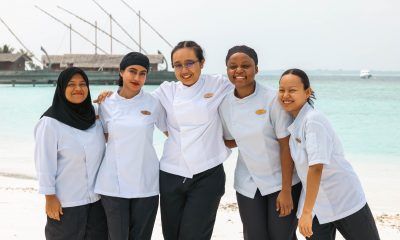
 Cooking1 week ago
Cooking1 week agoWomen at heart of kitchen: Milaidhoo Maldives marks International Women’s Day through gastronomy
-
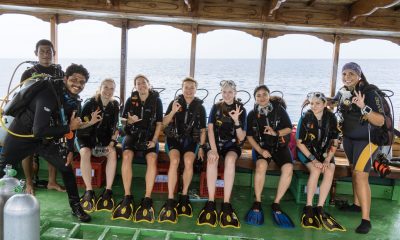
 Action1 week ago
Action1 week agoAtmosphere Foundation launches annual dive training scholarship for Maldivians
-

 Family1 week ago
Family1 week agoEaster goes playful at The Standard, Maldives with week-long Angry Birds celebration
-

 Entertainment1 week ago
Entertainment1 week ago‘One festival, every sense’: Fari Islands Festival announces August 2026 return
-
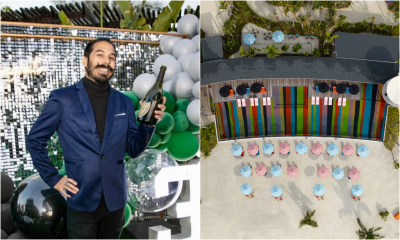
 Drink1 week ago
Drink1 week agoSO/ Maldives hosts tequila tasting and Lazuli Bar takeover for National Margarita Day
-
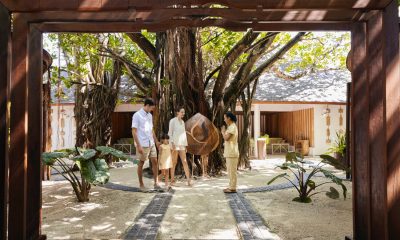
 Featured1 week ago
Featured1 week agoAncient banyan tree anchors spiritual experiences at Machchafushi Island Resort
-
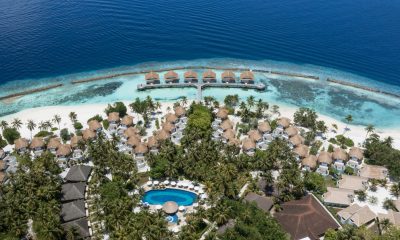
 Awards6 days ago
Awards6 days agoBandos Maldives earns Booking.com Traveller Review Award 2026















